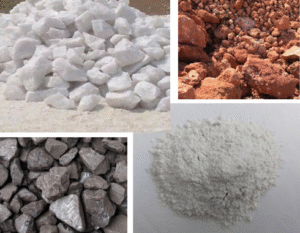Today’s construction and manufacturing world has grown increasingly reliant on the supply of raw materials. Similarly, industrial minerals and stone exporter companies are driving economic growth and worldwide resource needs. Industrial mineral and stone exporters play a vital role, by their steady supply chain, in providing the world with materials used to build highways, bridges, and products and high-quality ceramic raw materials for export. Let’s explore the worldwide impact of industrial mineral and stone exporters.
How do Industrial Minerals and Stones Impact Infrastructure?
Industrial minerals like quartz, limestone, feldspar, etc., provide substance for infrastructure development. Stones like granite, marble, sandstone, and more provide decorative and architectural stone resource applications. Countries that expand their supply chain of these resources help other countries by supplying their needs for highways, buildings, and residential construction.
A black sand stone exporter for instance, provides expansive product offerings in heavy-duty, decorative, and natural stones that are durable while providing an aesthetically pleasing product used for flooring, cladding, and landscaping. Their products not only enhance the aesthetics but also offer long-lasting strength.
Fueling Global Trade and Jobs
Exporters of industrial minerals and stones also contribute significantly to global trade. They create jobs in mining, processing, and logistics while they enable local economic value in regions with plentiful resources. Their reliable product and commitment to established standards give their international clients the confidence they need to rely on a consistent supply without concern for waste and poor quality within the global supply chain they use. Whether the marketplace is Asia, Europe, or somewhere else in the world, industrial mineral and stone companies export high-quality raw material to all corners of the earth.
Driving Innovation Through Specialized Materials
This sector is not limited to typical stone items but inherently encompasses specialized materials designed to perform industrial functions. An example is the growing demand of the high alumina materials exporter, who supplies high-alumina materials used specifically in the manufacture of many refractories on a large scale in cement and advanced ceramics.
These advanced materials possess unique performance properties, which allow for extreme temperature and toughness applications within steel plants, power plants, and the chemical industries. These advanced materials made their way towards the international markets and are the spark plug of innovation and industrial growth with the potential to impact the entire world of industry.
Sustainability and Future Prospects
As a consequence of increasing awareness about sustainability, many exporters in the sector are embracing eco-friendly practices within mining and processing for their products. They concentrate on waste reduction, transport efficiencies, and environmental impact. The future of this industry looks bright, with sustained demand for high-quality stones and minerals being fueled by urbanization and infrastructure projects around the globe.
Frequently Asked Questions
Q1. What does an industrial minerals and stone exporter do?
A1. An exporter identifies, processes, and supplies minerals and stones, including granite and marble, and industrial materials to export markets.
Q2. What is the significance of high-alumina materials?
A2. High-alumina materials are used in the manufacture of heat-resistant products, which are utilized in many industries, including cement, steel and power generation.
Q3. Where are black sandstones used?
A3. Black sandstones are used very commonly as flooring, cladding, and in landscaping due to their appearance and durability.




